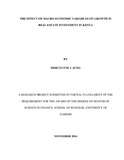| dc.description.abstract | The Real Estate industry has increasingly attracted the attention of investors in the recent
past. With such increase, it has been expected that the industry will significantly grow
and thus fulfill its role in provision of substantive returns as well as the basic need of
housing in Kenya. This has not been the case and thus this study sought to establish the
effect of macro-economic variables on growth in real estate investment in Kenya given
they are key in the growth of the industry. The study followed a descriptive research
design. The study used secondary data on annual real estate investments growth as
computed from the HassConsult. The study obtained the secondary data on the selected
macro-economic variables including average annual Exchange Rate (Ksh/USD) (%),
average annual growth in Diaspora Remittances (%), average annual growth in Money
Supply (M3) (%), average annual Inflation Rate (%), average annual GDP growth (%).
The data on macro-economic variables was obtained from Central Bank of Kenya (CBK)
and Kenya National Bureau of Statistics (KNBS). The data sets covered the period
between 2000-2013. The data was summarized or/and analyzed using excel spread sheets
and statistical package for social sciences. The findings were summarized in graphs and
tables. Regression analysis was conducted in order to establish various inferential
statistics; R, R-Square, P-Value and F-Test statistics to determine the relationship,
strength of the relationship and the statistical significance of the model. Notably, at least
one or more of the selected macro-economic variables and the real estate growth declined
over the periods; 2002-2005, 2007-2010, and 2011-2013. These periods were just before,
during or/and the years immediate to national elections. It is therefore worthy noting that
the politics around and during the electioneering period have an adverse effect on most
macro-economic variables, which in turn adversely affects real estate investments growth
in the country. Furthermore, the study established a strong positive relationship between
the selected macro-economic variables; Exchange Rate fluctuations, Growth in Diaspora
Remittances, Growth in Money Supply, Inflations, and GDP Growth since R and RSquare
was 0.872 and 0.761 respectively and because their corresponding coefficients
were positive. These results were supported by both P-Value and F-test statistics.
However, P-Values corresponding to each of the macro-economic variables indicate that
the variables were insignificant on their own in influence real estate growth. The study
concludes that there is a strong positive relationship between the macro-economic
variables and real estate investment growth. Also, the study concludes that growth in;
exchange rate, diaspora remittances, money in circulation, inflation rate, and real GDP
growth do not individually influence the growth in real estate investment in the country,
but the combination effect of the change of the macro-economic variables do influence
real estate growth. It is therefore recommended that policy makers and planners plan in
advance to be able to Manage Exchange rates and inflation rates. Proper and peaceful
political environment should be encouraged at all election periods to cut on the adverse
effects of bad political environment to the economy. | en_US |

